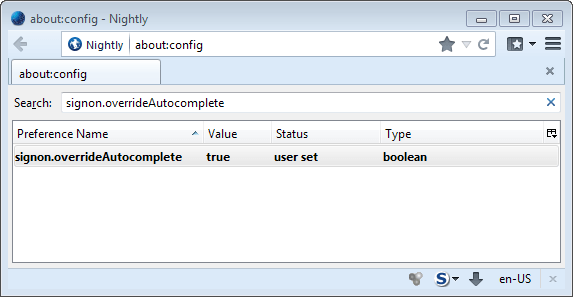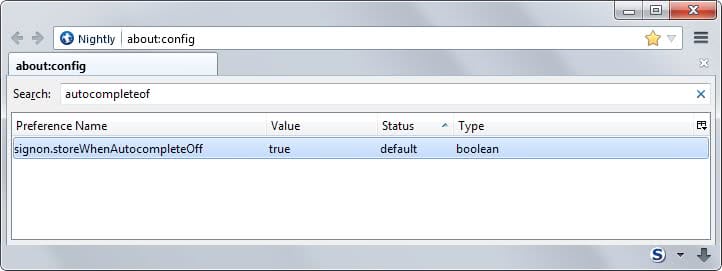Firefox 29: save and fill out autocomplete="off" passwords

Update: The feature has been implemented natively in Firefox and is enabled by default in all versions of the browser. It is controlled by the preference signon.storeWhenAutocompleteOff now which is set to true by default. You can disable it by double-clicking it to set it to false. The preference signon.overrideAutocomplete is no longer in use.
The autocomplete attribute specifies to web browsers whether stored data may be used to fill out the field automatically.
The attribute is commonly used on password fields to prevent autocomplete from working there. That's however not the only input type that is supported by it. It can also be added to text, search or email fields among others.
The attribute itself is Boolean, which means that it is either on or off. If it is not specified, it is considered on by default, which means that you will usually encounter autocomplete being set to off when you browse the Internet as some sites, banks for example, believe that it improves security.
All modern browsers support the attribute. Firefox users up until now had to rely on third party tools, a userscript that sets all off values of autocomplete to on for example, or third party password managers that ignore the attribute, to save and automatically fill out passwords on websites that use autocomplete off on password fields.


Firefox 29 is currently available as a Nightly build only. Mozilla has implemented a new feature in the web browser that Firefox users can make use of to ignore autocomplete on websites that use the feature. This basically means that passwords will be saved when entered the first time -- which sometimes did not work properly -- and that saved passwords will be used to automatically fill out the sign on form on those sites.
Previously, you may have noticed that passwords could not be saved or automatically filled out on some websites, which was usually caused by autocomplete being set to off on those sites.
The new preference signon.overrideAutocomplete is not enabled by default. If you want to enable it so that Firefox can save passwords if autocomplete is set to off, do the following:
- Type about:config in the Firefox address bar and tap on the enter-key afterwards.
- Confirm you will be careful if it is your first time doing so.
- Search for signon.overrideAutocomplete and wait until it is displayed.
- Double-click the preference to change its value from false to true.
- Setting it to true enables the feature, so that passwords on sites that use autocomplete="off" can be saved now by the web browser directly.
To undo the change, repeat the steps 1-4 again. This will set the value to false again.
It is interesting to note that the bug was filed in 2008 for the first time. According to the discussion on the page, it took Mozilla that long because no one did put work into it until recently. (via Sören)



















Because that attribute is bullshit. It’s security theater, just makes people write their password on a sticky note and paste it to their monitor.
Why would you do this? Why would you specifically by default have Firefox ignore security settings like the autocomplet attribute? Website developers set this for a reason
Hi: I also do not see the option. I do see the signon.storeWhenAutocompleteOff. However, there are sites that do not allow me to “remember” passwords.
Any suggestions?
Thanks!
I don’t see this option at all, and I have Firefox 33.1.1 . Did they remove this feature? I’ve added the variable, but nothing seems to have changed.
It seems that Mozilla has enabled it automatically. The new preference that is set to true by default is signon.storeWhenAutocompleteOff
No any point of using the GOOGLE GARBAGE. What they “FIREFOX AUSRALIS “is not anymorw FIREFOX wahe up !!!
Last version of the good FIREFOX is v. 28.0 !!!
Fixed in Firefox 29, which was released today, April 29th! A big shout-out to the team at Mozilla, who got it done, even if it _did_ take half an eternity to finally get it into the main release.
Wonderful news, I can’t wait for the team behind Cyberfox to integrate this bit of code in their respective release.
Thanks for the heads up Martin.